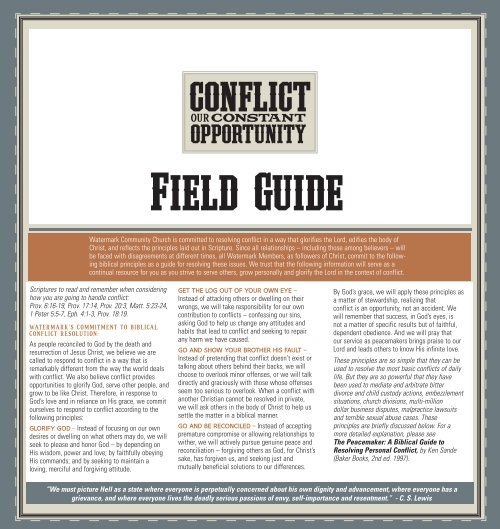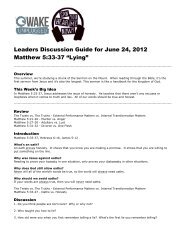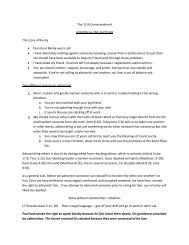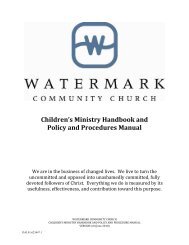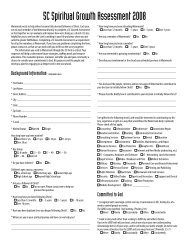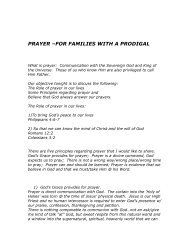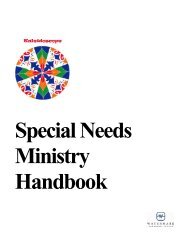The Conflict Field Guide - Watermark Community Church
The Conflict Field Guide - Watermark Community Church
The Conflict Field Guide - Watermark Community Church
Create successful ePaper yourself
Turn your PDF publications into a flip-book with our unique Google optimized e-Paper software.
<strong>Field</strong> <strong>Guide</strong><strong>Watermark</strong> <strong>Community</strong> <strong>Church</strong> is committed to resolving conflict in a way that glorifies the Lord, edifies the body ofChrist, and reflects the principles laid out in Scripture. Since all relationships – including those among believers – willbe faced with disagreements at different times, all <strong>Watermark</strong> Members, as followers of Christ, commit to the followingbiblical principles as a guide for resolving these issues. We trust that the following information will serve as acontinual resource for you as you strive to serve others, grow personally and glorify the Lord in the context of conflict.Scriptures to read and remember when consideringhow you are going to handle conflict:Prov. 6:16-19, Prov. 17:14, Prov. 20:3, Matt. 5:23-24,1 Peter 5:5-7, Eph. 4:1-3, Prov. 18:19.<strong>Watermark</strong>’s Commitment to Biblical<strong>Conflict</strong> Resolution:As people reconciled to God by the death andresurrection of Jesus Christ, we believe we arecalled to respond to conflict in a way that isremarkably different from the way the world dealswith conflict. We also believe conflict providesopportunities to glorify God, serve other people, andgrow to be like Christ. <strong>The</strong>refore, in response toGod’s love and in reliance on His grace, we commitourselves to respond to conflict according to thefollowing principles:Glorify God – Instead of focusing on our owndesires or dwelling on what others may do, we willseek to please and honor God – by depending onHis wisdom, power and love; by faithfully obeyingHis commands; and by seeking to maintain aloving, merciful and forgiving attitude.Get the log out of your own eye –Instead of attacking others or dwelling on theirwrongs, we will take responsibility for our owncontribution to conflicts – confessing our sins,asking God to help us change any attitudes andhabits that lead to conflict and seeking to repairany harm we have caused.Go and show your brother his fault –Instead of pretending that conflict doesn’t exist ortalking about others behind their backs, we willchoose to overlook minor offenses, or we will talkdirectly and graciously with those whose offensesseem too serious to overlook. When a conflict withanother Christian cannot be resolved in private,we will ask others in the body of Christ to help ussettle the matter in a biblical manner.Go and be reconciled – Instead of acceptingpremature compromise or allowing relationships towither, we will actively pursue genuine peace andreconciliation – forgiving others as God, for Christ’ssake, has forgiven us, and seeking just andmutually beneficial solutions to our differences.By God’s grace, we will apply these principles asa matter of stewardship, realizing thatconflict is an opportunity, not an accident. Wewill remember that success, in God’s eyes, isnot a matter of specific results but of faithful,dependent obedience. And we will pray thatour service as peacemakers brings praise to ourLord and leads others to know His infinite love.<strong>The</strong>se principles are so simple that they can beused to resolve the most basic conflicts of dailylife. But they are so powerful that they havebeen used to mediate and arbitrate bitterdivorce and child custody actions, embezzlementsituations, church divisions, multi-milliondollar business disputes, malpractice lawsuitsand terrible sexual abuse cases. <strong>The</strong>seprinciples are briefly discussed below. For amore detailed explanation, please see<strong>The</strong> Peacemaker: A Biblical <strong>Guide</strong> toResolving Personal <strong>Conflict</strong>, by Ken Sande(Baker Books, 2nd ed. 1997).“We must picture Hell as a state where everyone is perpetually concerned about his own dignity and advancement, where everyone has agrievance, and where everyone lives the deadly serious passions of envy, self-importance and resentment.” - C. S. Lewis
1See <strong>Conflict</strong> as an Opportunity<strong>Conflict</strong> is not necessarily bad or destructive. Evenwhen conflict is caused by sin and causes a great dealof stress, God can use it for good (Rom. 8:28-29). Asthe Apostle Paul wrote in 1 Corinthians 10:31-11:1,conflict actually provides three significant opportunities.By God’s grace, you can use conflict to:• Glorify God (by trusting, obeying andimitating Him).• Serve other people (by helping to bear theirburdens or by confronting them in love).• Grow to be like Christ (by confessing sin andturning from attitudes that promote conflict).<strong>The</strong>se concepts are totally overlooked in mostconflicts because people naturally focus onescaping from the situation or overcoming theiropponent. <strong>The</strong>refore, it is wise to periodicallystep back from a conflict and ask yourself whetheryou are doing all that you can to take advantageof these special opportunities.Glorify GodWhen the Apostle Paul urged the Corinthians tolive “to the glory of God,” he was not talking aboutone hour on Sunday morning. He wanted them toshow God honor and bring Him praise in day-to-daylife, especially by the way that they resolvedpersonal conflicts (1 Cor. 10:31).As mentioned above, you can glorify God in themidst of conflict by trusting Him, obeying Him andimitating Him (Prov. 3:4-6; John 14:15; Eph. 5:1).One of the best ways to keep these concernsuppermost in your mind is to regularly ask yourselfthis focusing question: “How can I please andhonor the Lord in this situation?”Preparing for the JourneyGet the log out of your own eye<strong>The</strong> most challenging part of peace-making is setforth in Matthew 7:5, where Jesus admonishes usto “...first take the log out of your own eye, andthen you will see clearly to take the speck out ofyour brother’s eye.”<strong>The</strong>re are generally two kinds of logs you need tolook for when seeing your part in the conflict. First,you need to consider your own attitudes and biases.Critical, negative or overly sensitive attitudes easilylead to unnecessary conflict.<strong>The</strong> other log you must deal with is actual sinfulwords and actions. Because we are often blind toour own failures, we must have honest friends whowill help us take an objective look at ourselves andface up to our contribution to a conflict.<strong>The</strong> most important aspect of getting the log outof your own eye is to go beyond the confessionof wrong behavior and face up to the root causeof that behavior. <strong>The</strong> Bible teaches that conflictcomes from the “desires at war within you” (James4:1-3; Matt. 15:18-19). Some of these desires areobviously sinful, such as wanting to conceal thetruth, bend others to your will or have revenge. Inmany situations, however, conflict is fueled by gooddesires that you have elevated to a sinful place,such as an unhealthy craving to be understood,loved, respected or vindicated (1 Peter 2:23).Any time you become excessively preoccupied withsomething, even a good thing, and seek to find happiness,security, or fulfillment in it rather than in God,you are guilty of idolatry. Idolatry inevitably leads toconflict with God. It also causes conflict with otherpeople. As James writes, when we want somethingbut don’t get it, we kill and covet, quarrel and fight(James 4:1-4).Having done the hard work of discoveringyour part in the conflict, it is time to take action.Below is a clear, seven-step process to help youfirst examine yourself and then move forwardas a peacemaker:1. Ask the Lord and others for help with selfawareness (1 John 1:8).• Ask God to show you where you have beenguilty of ”wrong worship,” which is to saywhere you have been focusing your attentionand love on something other than the Lord andHis desires. “Search me, O God, and know myheart; Try me and know my anxious thoughts;And see if there be any hurtful way in me; Andlead me in the everlasting way”(Ps.139:23-24).• Specifically identify and renounce the desirecontributing to the conflict.• Deliberately pursue right worship. Fix yourheart and mind on God and seek joy inHim alone.• Give others permission to speak into yourlife, and regularly ask them to help you seeany “logs” both in attitude and action.2. Address everyone involved as soon as possible(Matt. 5:23-24, Prov. 6:1-5).3. Avoid if, but, and maybe. (Don’t make excuses;be specific when possible with both attitudesand actions. Luke 15:17-24).4. Apologize. (Express sorrow for the way youaffected someone. Luke 15:21).5. Ask for forgiveness (Prov. 28:13).6. Accept the consequences (Luke 19:1-9).7. Alter your behavior. (Commit to changing harmfulhabits. Eph. 4:22-32, John 8:11).As God guides and empowers these efforts, youcan find freedom from the idols that fuel conflictand be motivated to make choices that will pleaseand honor Christ. This change in heart will usuallyspeed a resolution to a present problem, and atthe same time improve your ability to avoid similarconflicts in the future.
2Go and show your brother his faultDon’t Sweat the Small StuffOverlook Minor OffenSesAnother key principle of peacemaking involves aneffort to help others understand how they havecontributed to a conflict. Before you rush off to confrontsomeone, however, remember that it is appropriateto overlook minor offenses (Prov. 19:11). As ageneral rule, an offense should be overlooked if youcan answer “no” to all of the following questions:• Is the offense seriously dishonoring God?• Has it permanently damaged a relationship?• Is it seriously hurting other people?• Is it seriously hurting the offender himself?Don’t Spread the Big StuffTalk in PrivateIf you answer “yes” to any of these questions, anoffense is too serious to overlook, in which caseGod commands you to go and talk with the offenderprivately and lovingly about the situation (see Matt.18:15). As you do so, remember to:• Pray for humility and wisdom (1 Peter 5:5).• Plan your words carefully–think of how you wouldwant to be confronted (Prov. 15:1-2; 16:23).• Anticipate likely reactions and plan appropriateresponses– rehearsals can be very helpful(Prov. 20:18).• Choose the right time and place–talk in personwhenever possible (Prov. 16:21; 27:12).• Assume the best about the other person until youhave facts to prove otherwise (Prov. 18:17).• Listen carefully (Prov. 18:13).• Speak only to build others up (Eph. 4:29).• Ask for feedback from the other person(Prov. 18:2).• Trust God (Psalm 37:3).Don’t Stop if You’ve Been StiffedTake Others along (Matt. 18:17)If an initial confrontation does not resolve a conflict,do not give up. Review what was said anddone, and look for ways to approach the otherperson more effectively. <strong>The</strong>n try again with evenstronger prayer support.If you have done all you can to share your concernand the matter is still unchanged in that it is"too serious to overlook," you should ask one ortwo other people to meet with you and the personyou have approached to help you resolve yourdifferences (Matt. 18:16-20).Don't stop if it gets stickyAs unfortunate as it is, there are times whenthe only solution left is to expand the circle ofaccountability and wisdom to include an even widercommunity within the body of Christ. It isimperative that the process is not stopped short ofany Scriptural admonition to diligently preservethe unity that the Lords intends. Where conflict persists,it is the job of the wider communityof faith to speak boldly into the matter and wherenecessary separate itself from hard heartsthat refuse to deal with matters "too serious tooverlook," (Matt 18:17a; 1 Cor. 5:1-2) evenwhen that includes necessary separation untilsuch a time as when the sin issues creating theconflict are acknowledged and dealt with.Go and be reconciledOne of the unique features of biblical peacemakingis the pursuit of genuine forgiveness and reconciliation.Even though followers of Christ haveexperienced the greatest forgiveness in the world,we often fail to show that forgiveness to others. Tocover up our disobedience we often use the shallowstatement, “I forgive her – I just don’t want to haveanything to do with her again.” Just think, however,how you would feel if God said to you, “I forgiveyou; I just don’t want to have anything to do withyou again?”Praise God that He never says this! Instead, Heforgives you totally and opens the way for genuinereconciliation. He calls you to forgive others inexactly the same way: “Bear with each other andforgive whatever grievances you may have againstone another. Forgive as the Lord forgave you”(Col. 3:12-14; see also 1 Cor. 13:5; Ps. 103:12;Isa. 43:25). One way to imitate God’s forgivenessis to purpose to live with these actions andattitudes when you forgive someone:• I will not dwell on this incident.• I will not revisit this incident or use it against you.• I will not talk to others about this incident.• I will not allow this incident to stand between usor hinder our personal relationship.Remember that forgiveness is a spiritual processthat you cannot fully accomplish on your own.<strong>The</strong>refore, as you seek to forgive others, continuallyask God for grace to enable you to imitate Hiswonderful forgiveness toward you.Negotiate in a Biblical MannerEven when you manage to resolve personal offensesthrough confession and forgiveness, you maystill need to deal with substantive issues, whichmay involve money, property, or the exercise ofcertain rights. <strong>The</strong>se issues should not be sweptunder the carpet or automatically passed to ahigher authority. Instead, they should be negotiatedin a biblically faithful manner.As a general rule, you should try to negotiatesubstantive issues in a cooperative manner ratherthan a competitive manner. In other words,instead of aggressively pursuing your own interestsand letting others look out for themselves, youshould deliberately look for solutions that arebeneficial to everyone involved.As the Apostle Paul put it, “Do nothing out ofselfish ambition or vain conceit, but in humilityconsider others better than yourselves. Each of youshould look not only to your own interests, butalso to the interests of others” (Phil. 2:3-4; seeMatt. 22:39; 1 Cor. 13:5; Matt. 7:12).A biblical approach to negotiation may be summarizedin five basic steps, which we refer to asthe PAUSE principle:• Prepare (pray, get the facts, seek godly counsel,develop options)• Affirm relationships (show genuine concern andrespect for others)• Understand interests (identify others’ concerns,desires, needs, limitations, or fears)• Search for creative solutions (prayerful brainstorming)• Evaluate options objectively and reasonably(evaluate, don’t argue)If you have never used this approach to negotiationbefore, it will take time and practice (andsometimes advice from others) to become proficientat it. But it is well worth the effort, because learningthe PAUSE principle will help you not onlyresolve your present dispute but also negotiatemore effectively in all areas of your life.
3Be Prepared for Unreasonable PeopleWhenever you are responding to conflict, you needto realize that other people may harden their heartsand refuse to be reconciled to you. <strong>The</strong>re are twoways you can prepare for this possibility.First, remember that God does not measuresuccess in terms of results but in terms of faithfulobedience. He knows that you cannot forceother people to act in a certain way. <strong>The</strong>refore Hewill not hold you responsible for their actions orfor the ultimate outcome of a conflict.All God expects of you is to obey His revealedwill as faithfully as possible (see Rom. 12:18). If youdo that, no matter how the conflict turns out, youcan walk away with a clear conscience before God,knowing that His appraisal is, “Well done, goodand faithful servant.”Second, resolve that you will not give up onfinding a biblical solution. If a dispute is not easilyresolved, you may be tempted to say, “Well, Itried all the biblical principles I know, and they justdidn’t work. It looks like I’ll have to handlethis another way”– meaning, the world’s way.A follower of Christ should never close the Bible.When you try to resolve a conflict but do not seethe results you desire, you should seek God evenmore earnestly through prayer, the study of HisWord and the counsel of His church. As you do so,it is essential to keep your focus on Christ and allthat He has already done for you (Col. 3:1-4). It isalso helpful to follow five principles for overcomingevil, which are described in Romans 12:14-21:• Control your tongue (“Bless those who curse you.”See also Eph. 4:29).• Seek godly advisors (identify with others, and donot become isolated).• Keep doing what is right (1 Pet. 2;12, 15;3:15b-16).• Recognize your limits (instead of retaliating, staywithin proper biblical channels).• Use the ultimate weapon: deliberate,focused love (John 3:16; Luke 6:27-31).At the very least, these steps will protect youfrom being consumed by the acid of your ownbitterness and resentment if others continue tooppose you. And in some cases, God mayeventually use such actions to bring another personto repentance (1 Sam. 24:1-22).Even if other people persist in doing wrong, youcan continue to trust that God is in control and willdeal with them in His time (see Psalms 10 and 37).This kind of patience in the face of suffering is commendedby God (1 Pet. 2:19) and ultimately resultsin our good and His glory.Get Help from AboveNone of us can make complete and lasting peacewith others in our own strength. We must have helpfrom God. But before we can receive that help, weneed to be at peace with God Himself.Peace with God doesn’t come automatically,because all of us have sinned and alienatedourselves from Him (Isa. 59:1-2). Instead of livingthe perfect lives needed to enjoy fellowshipwith Him, each of us has a record stained with sin(Matt. 5:48; Rom. 3:23). As a result, we deserveto be eternally separated from God (Rom. 6:23a).That’s the bad news.<strong>The</strong> good news is that “God so loved the worldthat He gave His one and only Son, that whoeverbelieves in Him shall not perish but have eternallife” (John 3:16). Believing in Jesus means morethan being baptized, going to church, or trying tobe a good person. None of these activities canerase the sins you have already committed and willcontinue to commit throughout your life. Believingin Jesus means, first of all, admitting that you are asinner and acknowledging that there is no wayyou can earn God’s approval by your own works(Rom. 3:20; Eph. 2:8-9).Second, it means believing that Jesus paid thefull penalty for your sins when He died on thecross (Isa. 53:1-12; 1 Peter 2:24-25). In other words,believing in Jesus means trusting that Heexchanged records with you at Calvary – that is, Hetook your sinful record on Himself and paid for itin full, giving you His perfect record.When you believe in Jesus and receive Hisperfect record of righteousness, you can really havetrue peace with God. As you receive this peace,God will give you an increasing ability to makepeace with others by following the peacemakingprinciples He gives us in Scripture, many ofwhich are described above (Phil. 4:7; Matt. 5:9).If you have never confessed your sin to Godand believed in Jesus Christ as your Savior, Lord,and King, you can do so right now by sincerelypraying this prayer:Lord Jesus,I know that I am a sinner, and I realize that mygood deeds could never make up for my wrongs.I need your forgiveness. I believe that you diedfor my sins, and I want to turn away from them.I trust you now to be my Savior, and I willfollow you as my Lord and King, in the fellowshipof your church.If you have prayed this prayer, it is essentialthat you find fellowship with other Christiansin a church where the Bible is faithfully taughtand applied. This fellowship will help you tolearn more about God, grow in your faith, andobey what He commands, even when you areinvolved in a difficult conflict. Let us know how<strong>Watermark</strong> might be able to serve you as yourplace of fellowship.Get Help from the <strong>Church</strong>As God helps you to practice His peacemakingprinciples, you will be able to resolve mostof the normal conflicts of daily life on your own.Sometimes, however, you will encountersituations that you do not know how to handle.In such situations, it is wise and appropriateto turn to others in your community or tospiritually mature persons around you who cangive you advice on how you might be able toapply these principles more effectively.When individual advice does not enable youto resolve a dispute, you should ask one or twomutually respected friends to meet with youand your opponent to help you settle yourdifference through mediation or arbitration(Matt. 18:16-17; 1 Cor. 6:1-8).If there is any way that we can serve you orhelp you apply these principles to your relationships,please let us know. To order the messagesthat accompany these notes, please click on themedia tab at www.watermark.org.<strong>Watermark</strong> <strong>Community</strong> <strong>Church</strong>7540 LBJ FreewayDallas, Texas 75251214.361.2275 • fax: 214.361.6519www.watermark.orgThis handout is a supplement to<strong>Conflict</strong>: A Constant Opportunity, a message seriesby Todd Wagner, Pastor of <strong>Watermark</strong> <strong>Community</strong> <strong>Church</strong>(Go to www.watermarkradio.com to watch or listen to series).Material adapted or borrowed from Ken Sande whosegenerosity in sharing his excellent work on conflict in<strong>The</strong> Peacemaker: A Biblical <strong>Guide</strong> toResolving Personal <strong>Conflict</strong>. Copyright © 1997made this material possible.


